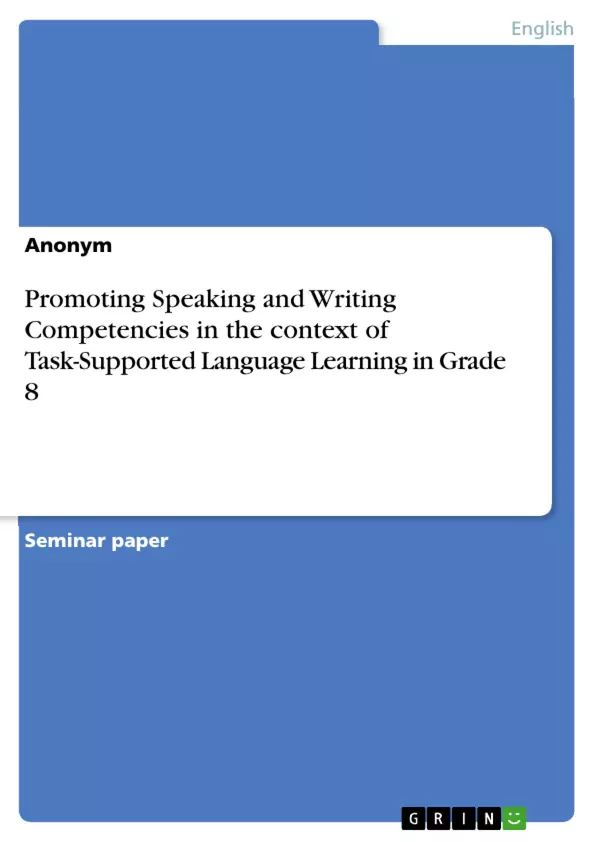The following term paper will give an overview of the principles of task-supported language learning (TSLL). Firstly, the basic concept of a “task” and its meaning will be analysed. Then, TSLL will be further explained by using the guidelines provided by Ellis (2003). Moreover, the sequencing of a task will be exemplified. Following this, the teacher and learner roles in the TSLL context will be investigated. Furthermore, the different options of task support will be elucidated.
Additionally, the speaking and writing competencies will be elaborated on. Possibilities of improving these will be mentioned. The target task C11 taken from the coursebook “Camden Town 4”, which is used in grade 8 at grammar schools in Hesse, will be analysed based on the previously mentioned aspects. Ideas on how this target task could be enhanced will be offered. Finally, it will be embedded in the according curriculum and analysed for the competencies that are to be achieved.
Inhaltsverzeichnis (Table of Contents)
- Introduction
- Task-Supported Language Learning
- Task Features
- Task Sequencing
- Task Support
- Role of the Teacher
- Role of the Learner
- Speaking and Writing
- Speaking
- Writing
- Target Task Analysis
- Task Features
- Task Sequencing
- Task Support
- Embedding in Curriculum
- Conclusion
- References
Zielsetzung und Themenschwerpunkte (Objectives and Key Themes)
This term paper aims to provide a comprehensive overview of the principles of task-supported language learning (TSLL) in the context of English as a Foreign Language (EFL) teaching. It examines the theoretical framework of TSLL and its relationship to task-based language teaching (TBLT) and communicative language teaching (CLT). The paper explores the role of teachers and learners in TSLL, with a focus on enhancing speaking and writing competencies. Specifically, the paper analyzes a target task from the coursebook "Camden Town 4" used in grade 8 at grammar schools in Hesse, examining its suitability for promoting language skills and identifying potential areas for improvement within a TSLL context.
- Principles of Task-Supported Language Learning (TSLL)
- Role of the Teacher and Learner in TSLL
- Enhancing Speaking and Writing Competencies in TSLL
- Analyzing Target Tasks for Suitability and Enhancement
- Integration of Target Tasks into Curriculum and Assessment of Competencies
Zusammenfassung der Kapitel (Chapter Summaries)
The introduction provides an overview of the importance of English as a lingua franca and the role of TSLL in EFL teaching. It highlights the need for teachers to adapt and optimize tasks for diverse learner groups. Chapter 2 delves into the principles of TSLL, drawing upon theoretical frameworks from TBLT and CLT. It explores key aspects of task design, sequencing, and support, as well as the roles of teachers and learners. Chapter 3 focuses on the development of speaking and writing competencies in TSLL contexts. It discusses strategies for promoting these skills through task-based activities. Chapter 4 presents a detailed analysis of the target task C11 from the coursebook "Camden Town 4." It examines the task features, sequencing, support, and its alignment with the curriculum. This analysis provides insights into the potential for enhancing the task to better support language acquisition.
Schlüsselwörter (Keywords)
This paper explores the key concepts of task-supported language learning (TSLL), task-based language teaching (TBLT), communicative language teaching (CLT), speaking and writing competencies, target task analysis, curriculum integration, and EFL teaching. It focuses on the analysis and enhancement of a specific target task from the coursebook "Camden Town 4" to optimize language learning for learners in grade 8 at grammar schools in Hesse.
Frequently Asked Questions
What is Task-Supported Language Learning (TSLL)?
TSLL is an approach where tasks are used to support the acquisition of specific linguistic features within a communicative framework.
How does TSLL differ from Task-Based Language Teaching (TBLT)?
While TBLT focuses on tasks as the core of the syllabus, TSLL uses tasks to reinforce language elements previously introduced or studied.
Which competencies are focused on in this paper?
The paper specifically investigates the promotion of speaking and writing competencies in 8th-grade English classes.
Which coursebook is analyzed in the study?
The study analyzes target tasks from the coursebook 'Camden Town 4', commonly used in Hessian grammar schools.
What is the role of the teacher in a TSLL environment?
The teacher acts as a facilitator and monitor, providing necessary 'scaffolding' and support during the task sequencing.
- Quote paper
- Anonym (Author), 2019, Promoting Speaking and Writing Competencies in the context of Task-Supported Language Learning in Grade 8, Munich, GRIN Verlag, https://www.grin.com/document/1266583



